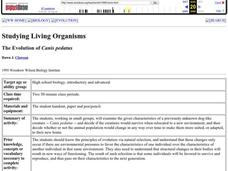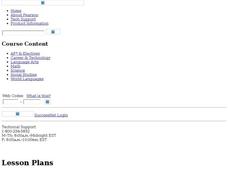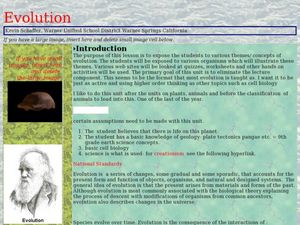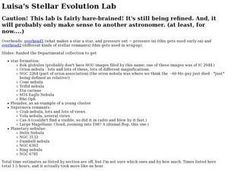Curated OER
The Evolution of Canis pedatus
Students, in groups, examine the given characteristics of a previously unknown dog-like creature, Canis pedatus. They discuss whether or not this species would show adaptations and survive if it were relocated to a new environment.
Curated OER
Reading and Thinking About Evolution
Learners explore evolution. They read magazine articles related to evolution. Students describe arguments for/against evolution that the author used. Learners discuss their findings.
Curated OER
Lamarck Is Dead!
Young scholars read Lamarck's obituary and respond to questions. They discuss the four laws from Lamarack's studies. Students apply this information to scientific theories in general.
Curated OER
Evolution, Genes, and Behavior
Students examine the roles of genes and evolution on behaviors. In groups, they identify the relationships among DNA, genes and chromosomes. They evaluate the different theories of language acquistion and how evolved tendencies interact...
Curated OER
Evolution
Tenth graders are introduced to the topic of evolution. Using the internet, they discuss Charles Darwin's life and work in this field of science. They examine fossils and discuss how they support the theory of evolution. They participate...
Curated OER
Luisa's Steller Evolution Lab
Students examine stars and constellations in the night sky. They complete a KWL chart and calculate the mass of stars. They also discuss how a star is formed.
Curated OER
Evolution in Action!
Students use the Internet to complete an interactive simulation about evolution. They follow certain species and discover the process of natural selection. They answer questions to test for comprehension.
Curated OER
Build a Bug
Students design an ideally adapted macroinvertebrate to live in a water habitat. They illustrate their animal, name it and specify the adaptations it has that enable it to survive.
Curated OER
Blocks And Screws (or "screwy Contrivances")
Students, given a block of wood and a screw or nail, are asked to put that screw or nail into a block. They examine how many contrivances and other imperfections found in living things are best explained by the process of evolution.
Curated OER
Why Do We Need Vitamin C in Our Diet?
Students compare/contrast the DNA sequence data of the rat GULO gene to the inactive human GULO gene. They translate and align the sequences, and propose a scenario to explain the occurrence of an inactive DNA sequence to that of an...
Curated OER
Inspired Science
Students explore the history of inventions and their difference from discoveries. They create timelines of inventions, demonstrating their connections to each other.
Curated OER
The Right Tool for the Job: Fishing Tools and Technology
Students use modern technology to research the history, design, and function of a specific tool or piece of fishing technology. They create a timeline and story about the evolution of the tool.
Curated OER
Mother Nature's Laboratory
Students research how various plants and animals adapt over time to specific habitats and for specific purposes. Students produce a pictorial report on an example of an animal or plant's adaptation.
Curated OER
13 Ways to Tell Time Backwards
Pupils explore different ways geological time can be measured: comparing the time dimensions for each method, the mechanisms of each method, and the materials used.
Curated OER
Why Don't Whales Have Legs?
Students are given a variety of materials and are asked to design a heat loss experiment that results in a reasonable explanation of "Why don't whales have legs?" students work with the theory of natural selection.
















